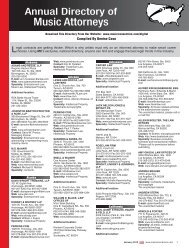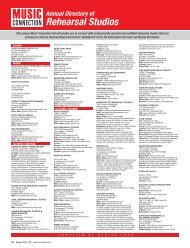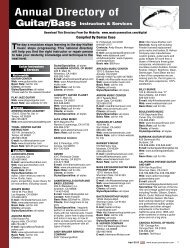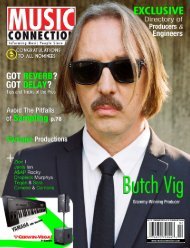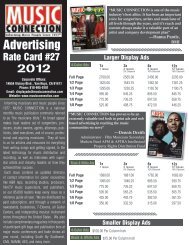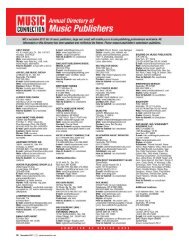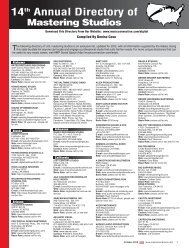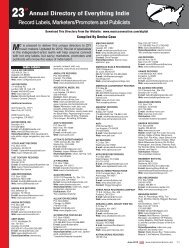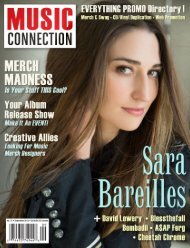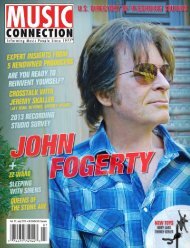CONTENTS
View/Download the new issue PDF here - Music Connection
View/Download the new issue PDF here - Music Connection
- No tags were found...
Create successful ePaper yourself
Turn your PDF publications into a flip-book with our unique Google optimized e-Paper software.
SoundExchange<br />
One of the most prominent organizations specializing in collecting<br />
digital revenue royalties is the Washington, DC-based SoundExchange,<br />
which is a non-profit performance rights organization. What does<br />
SoundExchange actually do for you? As the organization’s Marie Farrar<br />
Knowles explains, “SoundExchange represents the entire recorded<br />
music industry, including recording artists and record companies large<br />
and small. The licenses we administer enable digital music services to<br />
focus on what they do best, while ensuring that recording artists and<br />
record labels are compensated for their work.”<br />
Okay, so what is the organization's collection process? In other<br />
words, from whom does SoundExchange collect those royalties that are<br />
due to you?<br />
SoundExchange collects statutory royalties from satellite radio (such<br />
as SiriusXM), Internet radio, cable TV music channels and other outlets<br />
that stream music recordings. The organization came to prominence<br />
when a special group of copyright judges, called the Copyright Royalty<br />
Board, were appointed by the US Library of Congress to determine<br />
rates and terms for the digital performance of sound recordings. They<br />
basically named SoundExchange the sole company in the US to collect<br />
and distribute digital performance royalties<br />
on behalf of master right owners, such<br />
as record companies and recording<br />
artists.<br />
SoundExchange also represents<br />
all independent artists who control<br />
their own masters. The current rates<br />
will be in effect through Dec. 31,<br />
2017.<br />
“Today,” Knowles explains,<br />
“there are 2,000-plus digital<br />
radio services that leverage the<br />
license we administer to access<br />
any commercially available work.<br />
While this list is too long to share<br />
in this article, a few examples are<br />
services like iHeart Radio, Spotify<br />
Radio (mobile service), Pandora<br />
and SiriusXM.”<br />
How considerable are the<br />
royalties? SoundExchange<br />
announced on its news page<br />
that in 2012 its total distribution<br />
to artists was $462 million,<br />
which was a historical moment<br />
for the organization. These<br />
royalties continue to increase<br />
for everyone; I’ve seen<br />
my own SoundExchange<br />
royalties grow dramatically<br />
over the years.<br />
This royalty money,<br />
however, will not come to you automatically. In order<br />
to get the most accurate royalties, you need to provide<br />
SoundExchange with what is known as a “metadata<br />
sheet.” Though it is time consuming on your part, it is<br />
extremely rewarding in the long run. Providing this key<br />
information has become a standard in the digital world.<br />
Either you or someone you hire will have to list all of your<br />
releases, as well as a comprehensive breakdown of each<br />
song’s writers, publishers, track description and album<br />
title, etc. (It's a simple Excel document.)<br />
How important is such an organization for recording<br />
artists and record labels? Knowles states that the digital<br />
royalties SoundExchange is responsible for and the<br />
statutory license it administers is incredibly important to<br />
recording artists and record labels. “Currently,” she points<br />
out, “performers in the United States are only paid when<br />
their sound recordings are performed via digital radio—they<br />
do not enjoy a full performance right. In other words, they are<br />
not compensated when their work is broadcast on AM/FM radio.”<br />
By registering with SoundExchange the individuals who created the<br />
sound recording are now able to collect digital royalties for their work.<br />
SoundExchange does support legislation that would provide recording<br />
artists and record labels with the right to be paid royalties when their<br />
work is played via AM/FM radio. “We encourage all recording artists<br />
and labels to learn more and join us in this effort,” she says.<br />
I was so intrigued with their process because I had seen a significant<br />
increase in my own royalties. According to Knowles, in 2003, when<br />
SoundExchange became an independent non-profit organization, they<br />
“Sound-<br />
Exchange<br />
has put more<br />
than $1.5<br />
billion into<br />
music<br />
creators’<br />
pockets.”<br />
—Marie Farrar<br />
Knowles, Sound-<br />
Exchange<br />
were collecting royalty payments from approximately 400 digital radio<br />
services. Today, they collect and distribute royalties to artists and labels<br />
from more than 2,000 digital radio services, including satellite radio,<br />
Internet radio and cable TV channels.<br />
This means that in just a decade, according to Knowles, “Sound-<br />
Exchange has put more than $1.5 billion into music creators’ pockets.<br />
In fact, the organization’s third-quarter 2013 payments of $153.7 million<br />
mark the highest quarterly payment to recording artists and record<br />
labels to date. When compared to SoundExchange’s entire 2003<br />
distribution of $3 million, it is clear that more and more music fans are<br />
listening to their favorite artists through digital radio.”<br />
It is important to note, as SoundExchange points out on its site,<br />
“SoundExchange is the performance rights organization (PRO) for the<br />
digital age. The royalties that SoundExchange collects and distributes<br />
are for the featured artist and the sound recording copyright owner.<br />
ASCAP, BMI and SESAC collect and distribute royalties for the<br />
songwriter, composer and publisher. Both satellite radio providers and<br />
webcasters pay SoundExchange when they stream music due to their<br />
utilization of the statutory license.”<br />
It is still necessary, then, to join one of the three PROs: ASCAP, BMI<br />
or SESAC, to receive your publisher and writer royalties.<br />
Live Television<br />
Videotape<br />
Supplemental<br />
Markets Fund (LTVSMF)<br />
Another great royalty source that I’ve seen grow<br />
substantially in the 21st Century is LTVSMF. It collects<br />
and distributes residuals to musicians who have worked<br />
on live television/video productions.<br />
Shari Hoffman, Fund Manager of the LTVSMF,<br />
explains their exact role. “We’re a non-profit<br />
organization that works in association with the<br />
American Federation of Musicians (AFM) to<br />
ensure the collection, processing and distribution<br />
of residuals to qualifying musicians who have<br />
performed music used on live television<br />
programs, such as Saturday Night Live, The<br />
Late Show with David Letterman, The Tonight<br />
Show with Jay Leno, various award shows<br />
(GRAMMYS, Academy Awards, CMA Awards,<br />
etc.), live reality programs (American Idol,<br />
America’s Got Talent, The Voice, etc.), and the<br />
soap operas (which in the olden days were live<br />
broadcasts).”<br />
Hoffman says the basic contract provisions<br />
that generate revenue to the Fund are the result of<br />
a collective bargaining agreement negotiated between<br />
the AFM and the major television networks and television<br />
producers in the late 1980s and early 1990s.<br />
The actual responsibility to distribute these monies<br />
was transferred to the Film Musicians Secondary Markets<br />
Fund (FMSMF) in the late 1990s with an official “sub-fund”<br />
established to distribute monies collected for musicians<br />
working on these programs circa 2002, with a full-blown<br />
division formed in 2010 known today as the Live Television<br />
Videotape Supplemental Markets Fund.<br />
“The provision,” says Hoffman, “is that you had to have<br />
worked on at least one original AFM scoring session for a<br />
specific live television production. A live television/video<br />
production must generate some income or revenue as<br />
a result of exhibition in a supplemental market to trigger<br />
an obligation on the part of the producer/production<br />
company to contribute to the Fund.”<br />
How Important Is This For The Musician?<br />
Can a musician expect to be paid well beyond the<br />
original airdate of a program? Hoffman asserts that<br />
many musicians receive payments far in excess of their<br />
original session payments for a program, provided that they have<br />
worked under the AFM Television Videotape Agreement. “The<br />
payments,” she says, “can often continue for many years beyond<br />
the time when these programs were first produced, providing<br />
compensation for musicians and their heirs (beneficiaries) long after<br />
a musician has ceased being actively involved in recording and<br />
performing. Those who work non-union primarily get compensated<br />
only for their original session performance, and nothing else. Or, in<br />
other words, they work for a buyout.”<br />
For example, I get a check each year from the Live Television/<br />
November 2013 musicconnection.com 41



